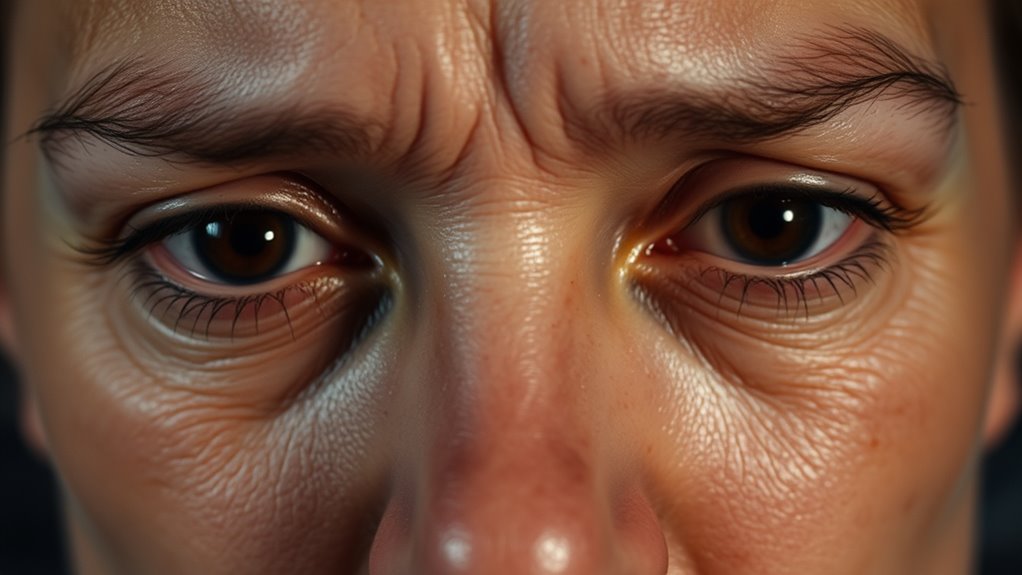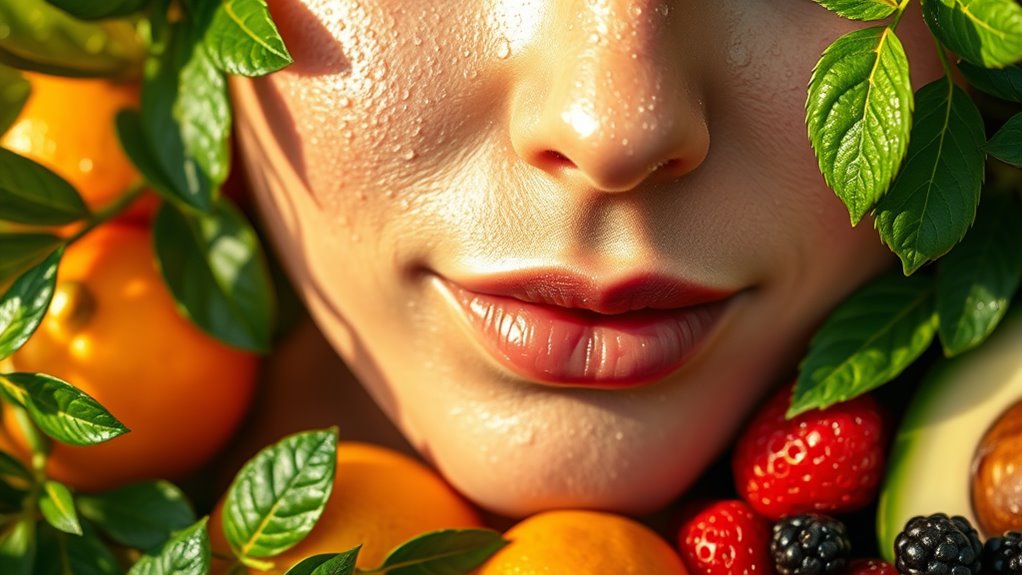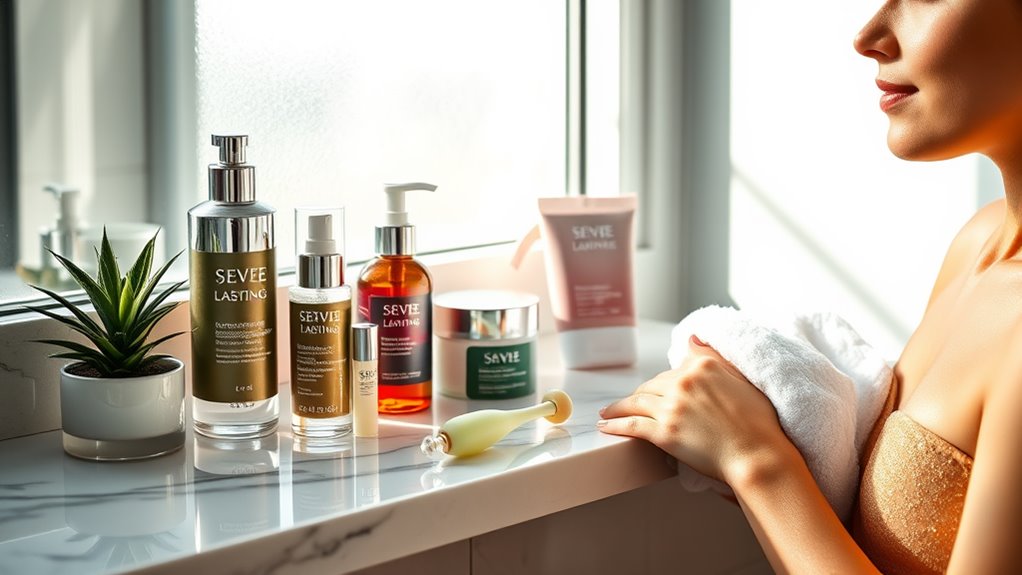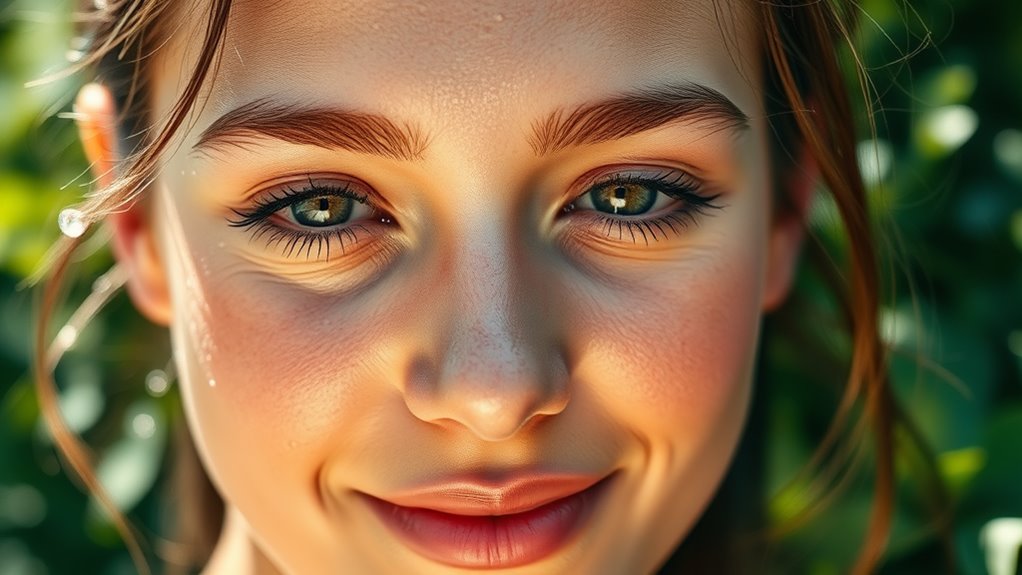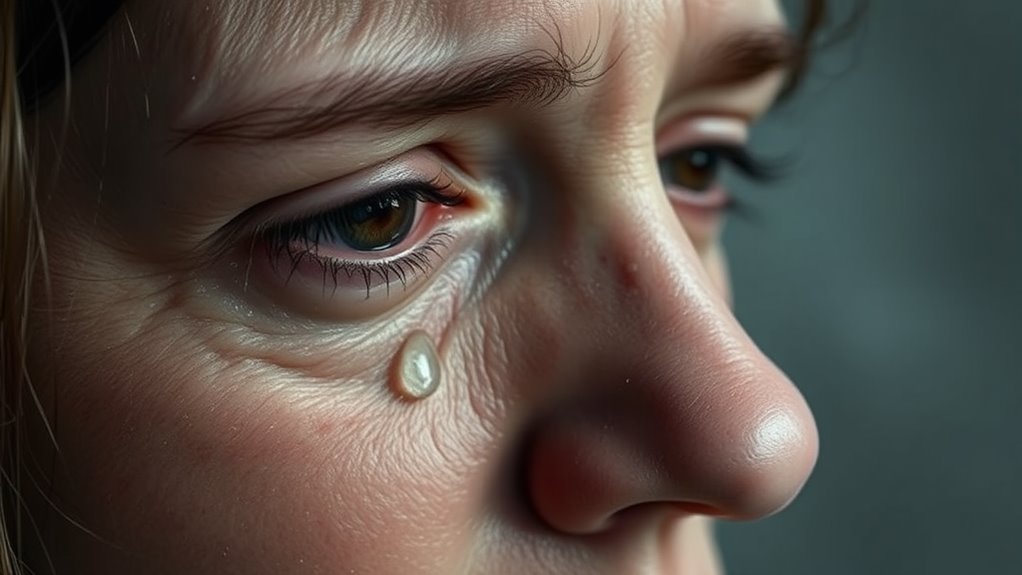What Happens to Your Skin When You Don’t Sleep Enough
When you don’t get enough sleep, your skin suffers significantly. You may notice increased wrinkles, dullness, and a tired complexion. Lack of sleep disrupts hormonal balance, leading to breakouts and heightened inflammation. Dark circles and puffiness around your eyes can also appear due to poor circulation and fluid retention. Overall skin hydration declines, deteriorating your skin barrier function. To understand how to counter these effects and improve your skin health, explore further insights on this topic.
Key Takeaways
- Insufficient sleep reduces collagen production, leading to premature aging, wrinkles, and decreased skin elasticity.
- Lack of sleep increases cortisol levels, triggering inflammation and oil production, which can result in more breakouts and acne.
- Sleep deprivation causes a dull complexion and dark circles due to disrupted cellular turnover and fluid retention around the eyes.
- Poor sleep impairs skin barrier function, increasing sensitivity and irritation, making skin more susceptible to redness and breakouts.
- Insufficient rest slows wound healing and diminishes overall skin vitality, affecting hydration levels and nutrient delivery to the skin.
The Importance of Sleep for Skin Health
Sleep acts as a vital restorative process for your skin, ensuring it maintains its health and resilience.
During sleep, your body undergoes repair mechanisms, boosting collagen production and enhancing skin barrier function. Research shows that insufficient sleep negatively impacts skin hydration and elasticity, leading to increased dryness and irritation.
Moreover, sleep effects on skin extend to immune response; inadequate rest can exacerbate inflammatory conditions like acne and eczema. Melatonin, a hormone released during sleep, plays a crucial role in protecting skin from oxidative stress. Furthermore, a lack of sleep can disrupt skin hydration levels, leading to a dull and tired appearance.
Prioritizing quality sleep not only improves your overall well-being but also significantly enhances skin vitality and appearance. To master skin health, aim for 7-9 hours of restorative sleep nightly, allowing your skin to rejuvenate effectively.
Premature Aging and Wrinkles
When you consistently skimp on sleep, your skin pays the price, leading to premature aging and the development of wrinkles.
Sleep deprivation disrupts the body’s natural repair processes, reducing collagen production and impairing skin elasticity. Studies show that inadequate sleep accelerates the breakdown of collagen, a critical protein that maintains skin structure.
Additionally, hormonal imbalances from sleep loss can exacerbate oxidative stress, further contributing to skin aging. You might notice fine lines becoming more pronounced and skin texture deteriorating.
Over time, the cumulative effects of insufficient rest manifest as wrinkles and sagging skin, making you appear older than you are. Moreover, the impact of sleep deprivation on skin health can be profound, leading to increased breakouts and a dull complexion.
Prioritizing quality sleep is essential for maintaining youthful, resilient skin and combating the signs of aging effectively.
Increased Breakouts and Acne
Lack of adequate rest can lead to an increase in breakouts and acne, as sleep deprivation disrupts your body’s hormonal balance and immune response.
Stress hormones like cortisol surge, triggering inflammation and oil production in your skin. This creates an environment ripe for acne development.
Here’s how sleep deficiency impacts your skin:
-
Hormonal Imbalance: Elevated cortisol levels can lead to increased sebaceous activity.
-
Impaired Immune Function: Your skin’s ability to fight bacteria diminishes, increasing infection risk.
-
Inflammation: Lack of sleep exacerbates inflammatory skin conditions, making breakouts worse.
-
Poor Skin Repair: Your skin’s ability to heal overnight is compromised, prolonging acne duration.
Additionally, poor sleep quality can worsen the appearance of existing blemishes and lead to new ones forming.
Prioritizing sleep is essential for maintaining clear, healthy skin and preventing unwanted breakouts.
Dull and Tired Complexion
Your skin’s radiance significantly diminishes without sufficient rest, leading to a dull and tired complexion. Research indicates that inadequate sleep disrupts your body’s circadian rhythm, impairing skin cell regeneration and repair.
During sleep, growth hormone levels rise, facilitating cellular turnover and rejuvenation. When you skimp on sleep, this process slows, resulting in a lackluster appearance.
Furthermore, sleep deprivation elevates cortisol levels, triggering inflammation and oxidative stress, which can further dull your complexion. Over time, this can lead to uneven skin tone and texture.
Prioritizing restorative sleep is crucial for maintaining skin vitality, as it directly influences your skin’s health and overall appearance. Aim for consistent, quality sleep to restore your skin’s natural glow and vitality. Additionally, adopting better sleep habits can enhance your skin’s overall appearance and promote healthier skin.
Dark Circles and Puffiness
Lack of sleep often leads to dark circles and puffiness around your eyes, primarily due to fluid retention and increased blood flow in the area.
These changes occur as your body struggles to recover from sleep deprivation, resulting in visible signs of fatigue.
To combat this, incorporating specific tips can help reduce puffiness and improve the appearance of dark circles.
Causes of Dark Circles
When sleep is insufficient, the delicate skin around the eyes often reveals the toll it takes, leading to the formation of dark circles and puffiness. Several factors contribute to this condition, primarily related to sleep deprivation and lifestyle choices:
-
Reduced Blood Circulation****: Lack of sleep causes blood vessels to dilate, resulting in darker pigmentation under the eyes.
-
Fluid Retention: Sleep deficiency leads to increased fluid retention, manifesting as puffiness.
-
Thinning Skin: Insufficient sleep accelerates skin aging, causing the skin around your eyes to thin and darken.
-
Allergies and Genetics: Allergic reactions and hereditary factors can exacerbate the appearance of dark circles.
Addressing these causes can significantly improve the appearance of your under-eye area.
Understanding these triggers is essential for effective management.
Reducing Puffiness Tips
Puffiness around the eyes can be addressed through several effective strategies that target the underlying causes. Implementing these tips can enhance your appearance and maintain skin health.
| Strategy | Description |
|---|---|
| Cold Compress | Apply a cold cloth for 10-15 minutes to reduce swelling. |
| Hydration | Drink plenty of water to prevent dehydration-related puffiness. |
| Sleep Position | Elevate your head while sleeping to minimize fluid retention. |
| Caffeine Infusion | Use eye creams with caffeine to constrict blood vessels and reduce puffiness. |
Impaired Skin Barrier Function
When you don’t get enough sleep, your skin’s barrier function can become impaired, leading to reduced hydration levels. This lack of moisture can make your skin more prone to sensitivity and irritation. Over time, these changes can exacerbate existing skin conditions and hinder overall skin health. Additionally, an impaired barrier can disrupt the skin’s ability to repair itself effectively, making it crucial to prioritize proper sleep for optimal skin health.
Reduced Hydration Levels
Lack of adequate sleep can significantly impair your skin’s hydration levels, leading to a compromised skin barrier function.
When your skin is dehydrated, it becomes less effective at protecting against environmental stressors and irritants. This can manifest in various ways, including:
- Increased transepidermal water loss (TEWL)
- Dull and uneven skin tone
- Enhanced visibility of fine lines and wrinkles
- Decreased elasticity and firmness
Without proper hydration, your skin struggles to maintain its natural moisture balance, making it more susceptible to damage.
Prioritizing sleep is essential for optimal skin health, as restorative rest allows your body to replenish and repair skin cells, ensuring your barrier function remains robust and your skin stays hydrated.
Increased Sensitivity and Irritation
Insufficient sleep can lead to an impaired skin barrier function, resulting in increased sensitivity and irritation. When you don’t get enough rest, your skin’s ability to protect itself diminishes, allowing irritants and allergens to penetrate more easily. This can manifest as redness, itching, or even breakouts. Understanding the factors at play can help you mitigate these effects.
| Factor | Effect on Skin Barrier | Suggested Action |
|---|---|---|
| Lack of Sleep | Deteriorates barrier function | Prioritize restorative sleep |
| Stress Hormones | Increases inflammation | Practice stress management |
| Dehydration | Weakens barrier integrity | Maintain hydration levels |
| Nutritional Deficiency | Reduces skin resilience | Optimize diet |
| Environmental Factors | Heightens sensitivity | Use suitable skincare |
Slower Wound Healing
Sleep deprivation can significantly impair your skin’s ability to heal from wounds. When you don’t get enough rest, several physiological processes are disrupted, leading to slower recovery times for any skin injuries. This can result in prolonged discomfort and increased risk of complications.
Key factors affected by insufficient sleep include:
-
Reduced collagen production: Essential for skin strength and elasticity.
-
Impaired immune response: Slower healing due to decreased inflammation control.
-
Altered hormone levels: Increased cortisol can hinder regenerative processes.
-
Diminished blood flow: Lower circulation means less oxygen and nutrients reach the damaged area.
Understanding these mechanisms can help you prioritize sleep as a crucial element in maintaining optimal skin health and enhancing healing efficiency.
Increased Inflammation
When you don’t get enough rest, your body can experience increased inflammation, which negatively impacts skin health. Chronic sleep deprivation elevates cortisol levels, leading to inflammatory responses that can exacerbate conditions like acne, eczema, and psoriasis. This inflammation manifests as redness, swelling, and discomfort, significantly affecting your skin’s appearance and overall resilience.
| Inflammatory Effects | Skin Implications |
|---|---|
| Elevated Cortisol | Increased Oil Production |
| Impaired Immune Response | More Breakouts |
| Vascular Changes | Puffiness |
| Collagen Breakdown | Premature Aging |
To mitigate these effects, prioritize restorative sleep, as it’s crucial for maintaining your skin’s integrity and vitality. Understanding this connection can empower you to adopt healthier sleep habits for improved skin health.
Uneven Skin Tone
When you don’t get enough sleep, hormonal imbalances can disrupt your skin’s natural tone, leading to uneven pigmentation.
Additionally, increased inflammation from sleep deprivation can exacerbate these issues, causing redness and dark patches.
Addressing your sleep patterns is crucial for maintaining a balanced and healthy complexion.
Hormonal Imbalance Effects
Lack of adequate sleep disrupts the body’s hormonal balance, leading to an uneven skin tone that can be both distressing and difficult to manage.
When you’re sleep-deprived, several hormonal changes occur, affecting your skin’s appearance:
-
Cortisol Increase: Elevated stress hormone levels can lead to increased oil production, causing breakouts and uneven pigmentation.
-
Reduced Growth Hormone: This hormone plays a crucial role in skin repair, and its deficiency can impede the healing process, resulting in dullness.
-
Impaired Melatonin Production: Sleep deprivation reduces melatonin, which can exacerbate pigmentation irregularities.
-
Increased Androgens: Higher levels of these hormones can stimulate sebaceous glands, contributing to uneven texture and tone.
Addressing sleep hygiene is essential for restoring hormonal balance and improving your skin’s appearance.
Increased Inflammation Response
Sleep deprivation triggers an increased inflammatory response in your body, which can significantly impact your skin’s appearance. When you don’t get enough rest, your cortisol levels rise, leading to inflammation and an uneven skin tone. This inflammation can manifest as redness, puffiness, and dark circles, diminishing your skin’s overall quality.
| Impact | Description | Evidence |
|---|---|---|
| Inflammation Increase | Elevated cortisol contributes to skin inflammation. | Journal of Investigative Dermatology |
| Uneven Skin Tone | Poor sleep disrupts melanin production, causing pigmentation issues. | Sleep Health Journal |
| Redness and Puffiness | Lack of sleep intensifies vascular permeability, leading to swelling. | British Journal of Dermatology |
| Dark Circles | Sleep deprivation reduces circulation, enhancing dark circles. | Sleep Medicine Reviews |
Impact on Skin Hydration
Since adequate sleep is crucial for overall health, insufficient rest can significantly affect your skin’s hydration.
When you don’t sleep enough, your skin’s barrier function weakens, leading to moisture loss. This can result in a dull appearance and increased dryness.
Several factors contribute to this effect:
-
Elevated cortisol levels: Sleep deprivation raises stress hormones, disrupting skin hydration.
-
Reduced blood flow: Lack of sleep limits circulation, impairing nutrient delivery to the skin.
-
Impaired barrier repair: Sleep is essential for cellular regeneration, affecting moisture retention.
-
Increased transepidermal water loss (TEWL): Poor sleep can compromise the skin’s ability to retain water.
Ultimately, prioritizing sleep is essential for maintaining optimal skin hydration and health.
Tips for Improving Sleep Quality
To enhance the quality of your sleep, it’s vital to establish a consistent bedtime routine that signals your body it’s time to wind down. Aim to go to bed and wake up at the same time daily, even on weekends.
Limit exposure to screens at least an hour before sleep, as blue light can disrupt melatonin production. Create a sleep-conducive environment by keeping your bedroom cool, dark, and quiet.
Incorporating relaxation techniques, such as deep breathing or meditation, can help reduce anxiety and prepare your mind for sleep. Additionally, avoid heavy meals, caffeine, and alcohol close to bedtime, as these can interfere with your sleep cycle.
Prioritize sleep hygiene to optimize skin health and overall well-being.
